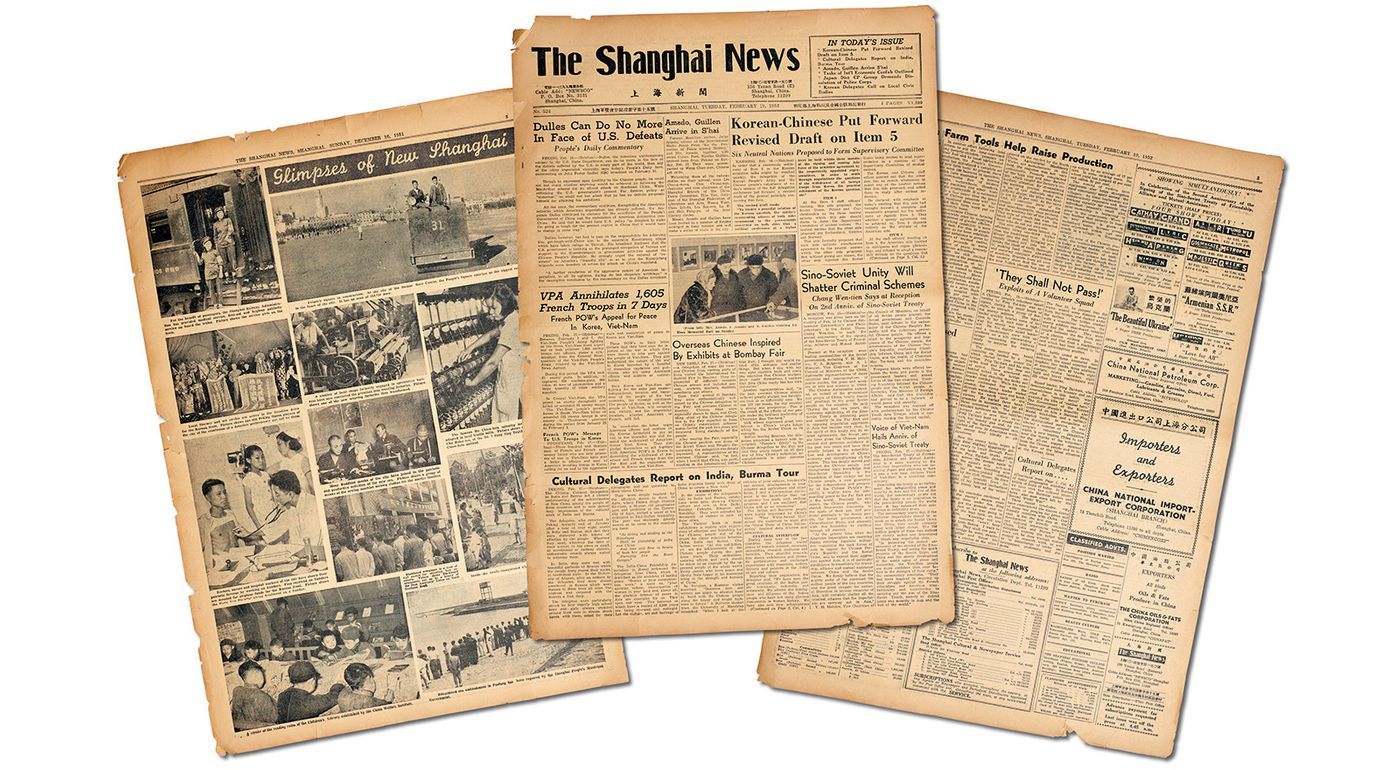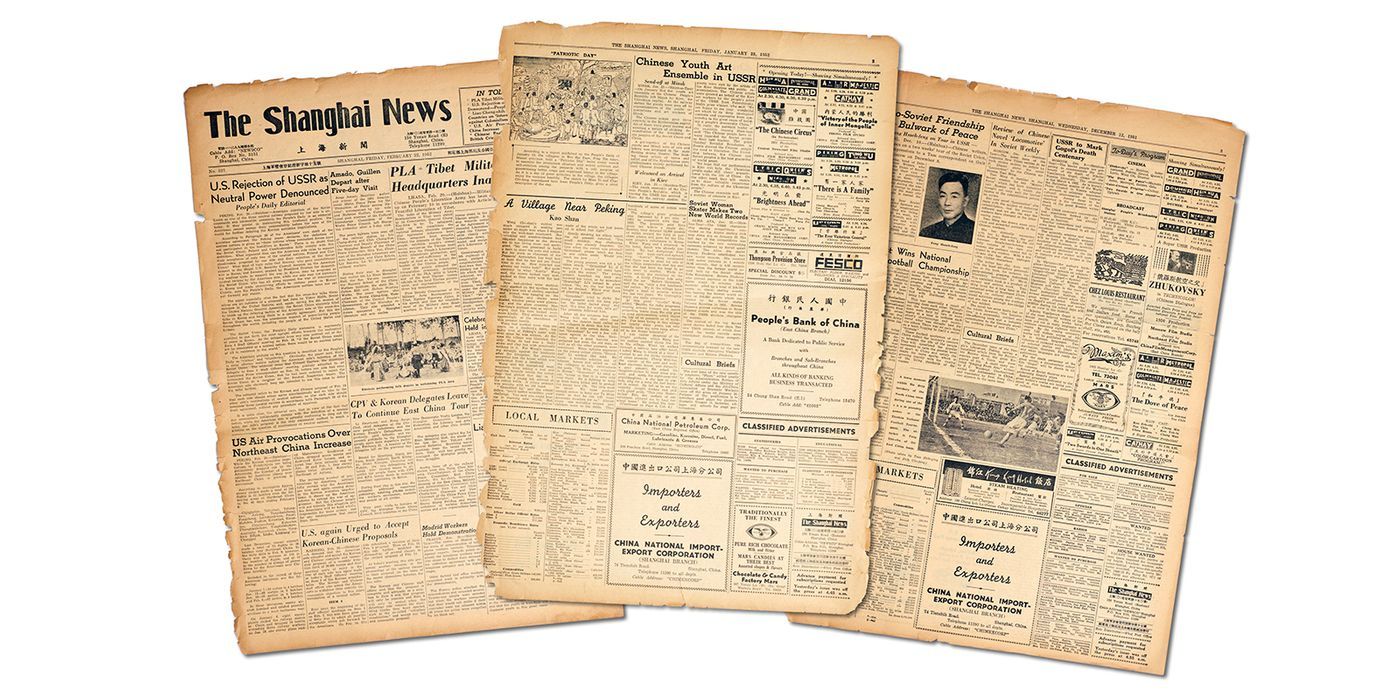
对49年以后中国历史感兴趣,鉴于中文互联网有关的记忆和记载正在被大规模地有计划地移除,本博主要用作收集网络“垃圾”,“拯救”网络记忆和记载,可能偶尔会有点原创,稍微会转一点资料性强创见多的不被主流刊载的学术性文章。另外,凡华夏文摘刊登过的文章一般不cross post,当然也会有例外,视情况而定。
JAMES PALMER Last Tango in Shanghai
转贴者曰:”到了1951年12月,人们仍然可以去A.A.Ling舞厅...年轻的女士还可以把头发梳成波浪形,用进口口红把自己打扮得漂漂亮亮…电影院仍在营业,虽然不同于30年代上海电影的黄金时代,但至少还有’边疆战士‘这样的健康影片…
这一切都将在未来几年内消失。”
—《上海最后的探戈》
Last Tango in Shanghai
How the ads in a crumbling newspaper offer glimpses of a vanished world.
BY JAMES PALMER
JANUARY 3, 2019, 10:38 AM

In the dying years of cosmopolitan Shanghai, as the Chinese People’s Liberation Army marched along its boulevards and Communist Party bureaucrats demanded the keys to its once thriving businesses, one lonely English-language paper still haunted the newsstands.
The Shanghai News was the successor to the North China Daily News, which had once been the most important English-language paper in a country with a thriving multilingual press and four English dailies in Shanghai alone. In anticipation of the closure of the Daily News in March 1951, the owners—the Morris family—launched the Shanghai News. The Daily News staff, at least those who hadn’t already left the city, stayed on, stuck translating and editing copy force-fed to them from Xinhua, the national newswire.
The headlines were classic propaganda, many of them related to the raging Korean War and the banal exchanges of Communist leaders: “U.S.-KMT Slander Denounced,” “Chairman Mao Replies to Ho Chi Minh’s Greetings.” Readers craving the entire text of Soviet Foreign Minister Andrey Vyshinsky’s speeches were not disappointed. In the Shanghai News’s inside pages, every harvest was a record, every factory a marvel of the future, and every woman and peasant liberated.
But in the classified ads, the real story of the Shanghai International Settlement’s final years unspooled. The city had long been a European outpost in China, packed with entrepreneurs, missionaries, and refugees, and protected by the extraterritorial concessions forced on the failing Qing empire in the 19th century by the European powers. Some foreign families had been there for generations. Soon they would all be leaving, whether they knew it or not.
Foreigners were never officially expelled en masse, but their welcome had clearly expired. The businesses that tried to stay faced a hostile regime. Dotted among the paper’s columns were so-called “Public Apologies.” These were a weird fusion of Western corporate public relations and Maoist self-confession, in which foreign companies acknowledged their violations of the new laws. From 1950 to 1952, foreign businesses disappeared almost entirely from the pages, replaced by ads for new state-owned enterprises.

When the Shanghai News launched, tens of thousands of people had already fled. The classified ads telegraphed desperation: “Portuguese speaks Chinese, not leaving,” “Importer, Electro-Medical Lines, technical expert, not leaving, open for engagement,” “Foreigner, leaving: wishes to sell carpets, dinner set, etc.” Every issue carried prominent advertisements for international moving firms, flights to Europe, and auction houses that would help sell off household goods.
Yet it was still possible, as of December 1951, to go to the A.A. Ling Ballroom, which promised to be “The Cosiest Night Spot In Town,” to dance to the mambo of “Moro and his Rhumbandidos,” fronted by “the one and only MISS VICTORIA.” A young lady could still have her hair set in waves or doll herself up with imported lipstick. Afterward, she and her beau could eat in the newly opened Andy’s Restaurant, a perfect spot for “Foreign Food And Chinese Tea By Cooks of the Former Foreign Y.M.C.A,” or snack on mince pies and plum puddings at Bianchi’s before going to pick up Christmas cards at Anderson Brothers. The cinemas were still open, but instead of the sultry hits of the 1930s, the golden age of Shanghai film, when local production houses had turned out hit after hit, movie houses now offered such wholesome fare as the Chinese documentary Frontier Fighters and Big Turnip (a Super USSR Production).
All this would be gone in the next few years.
The Shanghai News itself wouldn’t see its third birthday; the Morrises shuttered it over an argument with the government about the Korean War and taxes.
We’ll never know what happened to the “Chinese lady” who taught “Mandarin and Shanghai dialect” or to the ballroom dancing instructors and trained clerks still looking to make a living as the world crumbled around them. The 1957 Anti-Rightist Campaign was coming, a brutal predecessor to the full-blown madness of the Cultural Revolution.
Perhaps one of them, though, preserved these papers hidden from view—until they surfaced in a Beijing flea market 60 years later.
This article originally appeared in the Winter 2019 issue of Foreign Policy magazine.
https://foreignpolicy.com/2019/01/03/last-tango-in-shanghai-1950s-china-english-language-newspaper/
喜欢我的文章吗?
别忘了给点支持与赞赏,让我知道创作的路上有你陪伴。
发布评论…